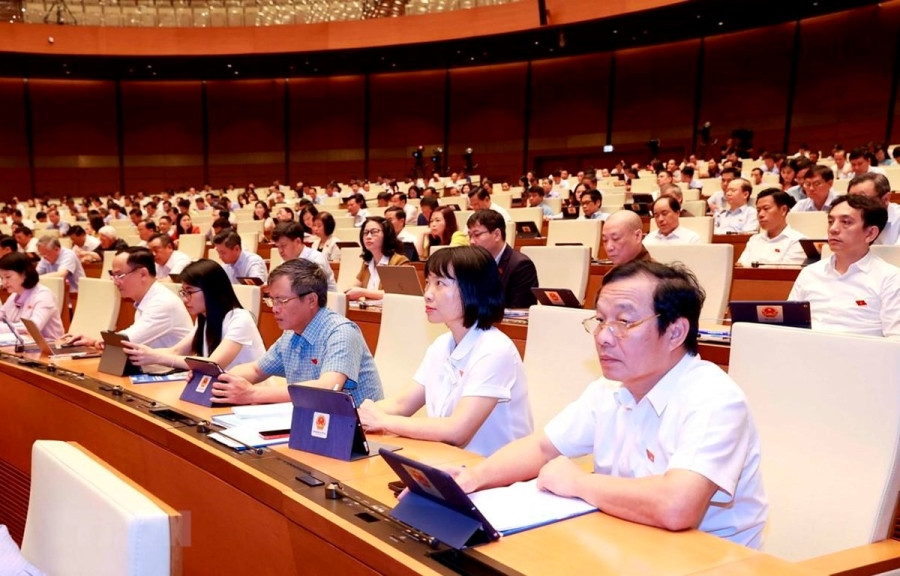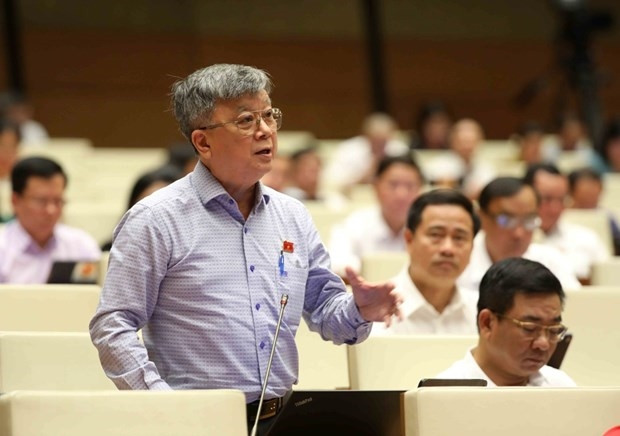Many National Assembly deputies agreed on the need to quickly develop a Law on Gender Transition to affirm, respect and ensure the human rights and civil rights of transgender people.

Delegation of National Assembly Deputies of Hai Duong province attends discussion at the hall
Many draft laws have been proposed by National Assembly deputies to be included in the Law and Ordinance Development Program in the coming time to ensure the completion of policies and their conformity with reality.
It is necessary to build a Law on Gender Reassignment
At the 5th Session of the 15th National Assembly on the morning of May 23, Chairman of the National Assembly's Law Committee Hoang Thanh Tung said that regarding the Gender Transition Law project, National Assembly Deputies proposed to include it in the 2024 Law and Ordinance Development Program. The Government's opinions and the review opinions of the National Assembly's agencies all agreed on the necessity of promulgating the Law to implement Article 37 of the Civil Code.
The Standing Committee of the National Assembly found that the dossier proposing the drafting of the Basic Law ensures the requirements prescribed by the Law on Promulgation of Legal Documents, therefore, it agreed to submit the draft Law to the National Assembly for consideration and decision to include the draft Law in the 2024 Program and agreed with the National Assembly deputies to adjust the time for submission to the National Assembly for comments at the 8th session and approval at the 9th session to have more time for research, careful preparation, and ensure the quality of drafting the draft Law.
Discussing in the hall, agreeing with the need to develop a Law on Gender Reassignment, delegate Thai Thi An Chung, National Assembly Delegation of Nghe An province said that the 2015 Civil Code has decided that gender reassignment is carried out according to the provisions of the law.
However, according to delegate Thai Thi An Chung, when the Civil Code came into effect, there was still no document regulating gender reassignment. Through studying documents related to the proposal to develop a Gender Reassignment Law prepared by National Assembly delegate Nguyen Anh Tri, and the report on the review of the proposal to develop the law by the National Assembly's Law Committee, the delegate agreed with the need to quickly develop this bill to affirm, respect and ensure the human rights and civil rights of transgender people.
Emphasizing that the Gender Transition Law proposed by delegate Nguyen Anh Tri is a very brave and civilized step forward, delegate Nguyen Quang Huan, National Assembly Delegation of Binh Duong province, said that the draft law has a full legal basis to develop the Gender Transition Law.
However, Mr. Huan also expressed concern about the narrowing of the scope of regulation compared to the first time the law was proposed, according to which the draft law only focuses on two subjects: men and women and only focuses on the issue of gender transition, while in reality there are some subjects in the community of people with special genders (LGBT) that have not received attention such as bisexual and homosexual people.
Expressing gratitude for the very good and necessary contributions, which contained responsibility, affection and high agreement of the National Assembly delegates on the necessity of developing the Law on Gender Transition, delegate Nguyen Anh Tri, National Assembly Delegation of Hanoi informed that up to this point, he has received a lot of support, comments and contributions from agencies and at the same time wished to clearly define the responsibilities of relevant agencies in supporting delegates in drafting the law according to the provisions of the Law on promulgation of legal documents.
Proposal to add more Laws to the National Assembly's agenda
Regarding the 2005 Commercial Law, Delegate Le Xuan Than, National Assembly Delegation of Khanh Hoa Province, said that the e-commerce sector is currently regulated by 3 Decrees. The Commercial Law was established nearly 20 years ago, and now has many contradictions and is outdated compared to the 2015 Civil Code, unable to keep up with the development of e-commerce.
Therefore, the Delegate proposed to consider amending the Law on Commerce and the Law on Commercial Arbitration to synchronize with the Civil Code, meeting development requirements.
Considering that from 2005 to present, Vietnam has participated in many international agreements and conventions, digital technology and digital trade have developed strongly in the context of the constantly developing world economy, so the 2005 Commercial Law has become outdated, delegate Truong Trong Nghia, Ho Chi Minh City National Assembly Delegation proposed to add the Commercial Law to the Law and Legislation Development Program of the 15th National Assembly.

Ho Chi Minh City National Assembly Delegate Truong Trong Nghia speaks at the discussion session in the National Assembly hall.
In addition, Delegate Nghia proposed to add the Special Urban Law to the Law and Ordinance Building Program and the Orientation Project for the XV term.
Emphasizing that the Law on Special Urban Areas is the orientation for the development of other cities in our country such as Hai Phong, Da Nang, Nha Trang, Can Tho, therefore, the delegate said that it is time for us to build a Law on Special Urban Areas to operate and manage special cities with effective legal documents, while up to now, we have only made separate resolutions, of a pilot nature with different forms of piloting.
"Therefore, the development of a Special Urban Law is necessary, and requires medium- and long-term orientation," Mr. Nghia asserted.
Delegate Thai Thi An Chung also proposed that the National Assembly consider including in the 2023 Law and Ordinance Development Program the Law amending and supplementing a number of articles of the 2012 Law on Tobacco Harm Prevention and Control to control and restrict the use of e-cigarettes and new generation cigarettes.
According to Ms. Chung, the use of electronic cigarettes by students is currently an alarming issue. Electronic cigarettes are easily bought and sold, and many students have suffered from psychosis, hallucinations or respiratory problems, and even nearly died from smoking electronic cigarettes.
“Although the 2012 Law on Tobacco Harm Prevention strictly prohibits people under 18 years of age from using, buying, and selling cigarettes; people selling or supplying cigarettes to people under 18 years of age; and selling cigarettes outside the gates of nurseries, kindergartens, schools, hospitals, etc. However, the authorities do not have enough legal corridors to handle the situation because Decree No. 77/2013/ND-CP only applies to traditional cigarettes; Decree 98/2020/ND-CP also only stipulates administrative sanctions for smuggled cigarettes, which are prohibited goods,” said this delegate.
According to VNA